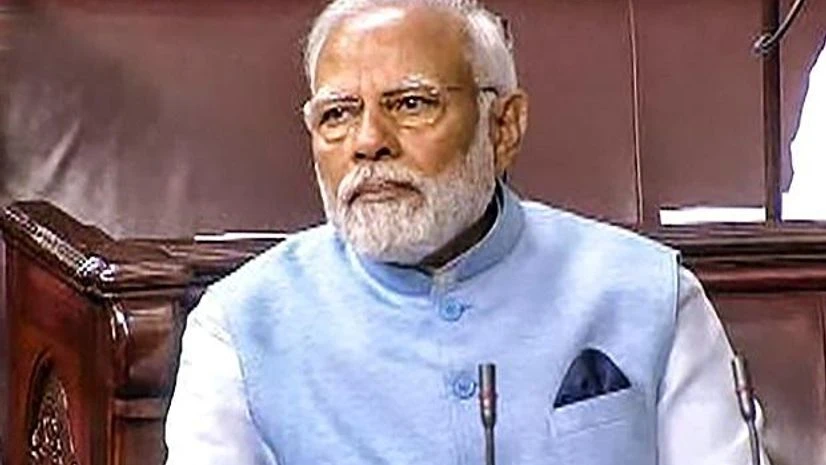The India-Japan global partnership is based on shared democratic values and respect for the rule of law and promotes peace and stability in the Indo-Pacific, Prime Minister Narendra Modi said on Monday after holding wide-ranging talks with his Japanese counterpart Fumio Kishida.
The two prime ministers largely focused on significantly boosting cooperation in areas of clean energy, semiconductors and co-development of military hardware besides exploring ways to deal with regional security challenges amidst the increasing assertiveness of China.
During the talks, Modi conveyed to Kishida that one of the areas of very strong cooperation between India and Japan could be co-innovation, co-design co-creation in the defence manufacturing sector, officials said.
Modi and Kishida also vowed to work together to deal with pressing global challenges under India's presidency of the G20 and Japan's chairship of the G7 grouping.
Kishida, who was in India for just about 27 hours, said he invited Modi to the G-7 summit in Hiroshima in May, and the offer was immediately accepted.
Also Read
On the sidelines of the talks, a note was exchanged between the two sides concerning the provision of the fourth tranche of a Japanese loan of up to 300 billion yen (around Rs 18,000 crore) for the Mumbai-Ahmedabad high-speed rail.
"The India-Japan Special Strategic and Global Partnership is based on our shared democratic values, and respect for the rule of law in the international arena," Modi said in his media statement.
"Strengthening this partnership is not only important for both our countries, but it also promotes peace, prosperity and stability in the Indo-Pacific region. In our conversation today, we have reviewed the progress made in our bilateral relations," he added.
The Japanese prime minister arrived in Delhi this morning on a brief visit amid global geopolitical turmoil over the Ukraine conflict and increasing concerns over China's aggressive behaviour in the Indo-Pacific.
Modi said he and Kishida exchanged views on defence equipment and technology collaboration, trade, health, and digital partnership.
There was also a fruitful discussion on the importance of reliable supply chains in semiconductors and other critical technologies, he said.
"Last year, we had set a target of Japanese investment of 5 trillion yen in India in the next 5 years, that is, Rs 3,20,000 crore rupees. It is a matter of satisfaction that there has been good progress in this direction," Modi said.
Modi said "fast" progress is being made on the Mumbai-Ahmedabad high-speed rail project.
"Our meeting today is special for another reason as well. This year India is chairing the G20, and Japan is chairing the G7. And therefore, this is the perfect opportunity to work together on our respective priorities and interests," Modi said, adding he explained in detail to Kishida about India's priorities for its G20 Presidency.
In his remarks, Kishida said Tokyo's economic cooperation with New Delhi continues to grow rapidly and it will not only support further development of India but create significant economic opportunities for Japan.
Briefing reporters, Foreign Secretary Vinay Kwatra said Modi and Kishida held substantive discussions commensurate with the depth of the India-Japan engagement and that the talks covered cooperation in areas of defence and security, economic partnership, climate and energy, people-to-people exchanges and skill development.
Asked whether challenges being faced by the two countries from China figured in the talks, Kwatra indicated that the matter figured in the meeting.
"They spoke about the challenges that we face in the region and how India and Japan and other like-minded countries can work together to address those challenges and cooperate in the wider expanse of the Indo-Pacific," he said.
PM Modi conveyed to Kishida that one of the areas of very strong cooperation between India and Japan could be co-innovation, co-design co-creation, Kwatra said.
The foreign secretary said Prime Minister Modi made it clear to his Japanese counterpart that when it comes to private investment and foreign direct investment in the field of defence, the two spheres are completely open in India.
Kwatra said the Japanese companies are not only invited but are also encouraged to harness the opportunities and advantages that are inherent in the Indian manufacturing ecosystem and that the 'Make-in-India' initiative is not just for India but also for the rest of the world.
He said the two leaders also discussed regional issues of significance including the Indo-Pacific.
(Only the headline and picture of this report may have been reworked by the Business Standard staff; the rest of the content is auto-generated from a syndicated feed.)

)
